#emotional distress
Text

Louis-Jean-François Lagrenée (1724-1805)
"Love Consoling Painting from the Critics of her Enemies" (1781)
Oil on panel
Located in the Louvre Museum, Paris, Francec
#paintings#art#artwork#allegorical painting#allegory#louis jean françois lagrenée#louis jean franccois lagrenee#oil on panel#oil on wood panel#fine art#french artist#love#criticism#emotional distress#dispair#pain#anguish#comfort#comforting#reassurance#support#supportive#1780s#late 1700s#late 18th century#putto#female portrait#portrait of a woman#a queue work of art
150 notes
·
View notes
Text
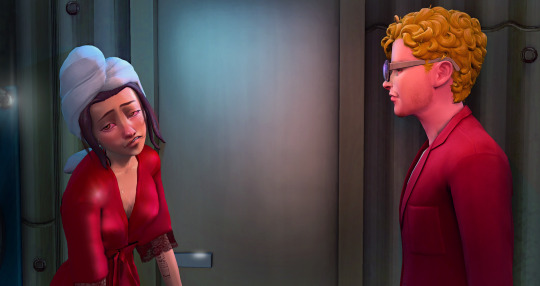
part 2
<read part 1 first, here>
Sunglo: You've been crying. I notice you've washed the smell of smoke off.
Coni: [Voice strained] Glo, baby, I'm tired.

He reaches to touch her arm, but she proceeds past him.
Sunglo: Then let's not drag this out. Where is she? What happened to her?
Coni: She's gone, Sunglo. [Keeps walking]
Sunglo: Gone? Concept—wait! Get back here!
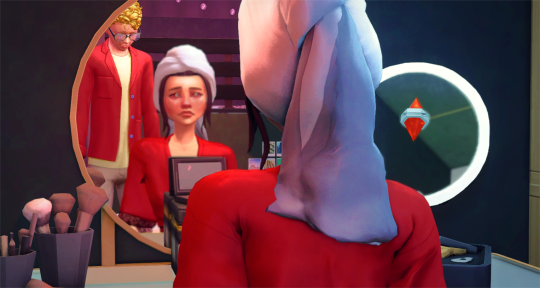

Coni sits in front of her vanity table, while Sunglo stands behind her, exerting every effort to steady his emotions.
Sunglo: [Calmly] What do you mean she's gone, Concept?
Coni glances down at the gleaming ring Sunglo gave her, passed down from his great-grandmother.

Coni: There was a malfunction that resulted in her combustion. She was destroyed. I'm sorry. You trusted me with your best bot and I failed you.
Sunglo: [Shakes head vigorously] No, that's impossible. Give me a detailed incident report if that's truly the case.
Coni: Stop, I just lost someone too. I'm in no position to do that right now, please.
Sunglo falls silent, stunned.

Sunglo: Coni… If there's something you're not telling me…
Coni: [Voice sharpens] WHAT, SUNGLO? What are you going to do? Hm?
Sunglo: I'll find out. I can access her data, her surveillance. I'll figure it all out on my own, Concept. If I have to, I will.
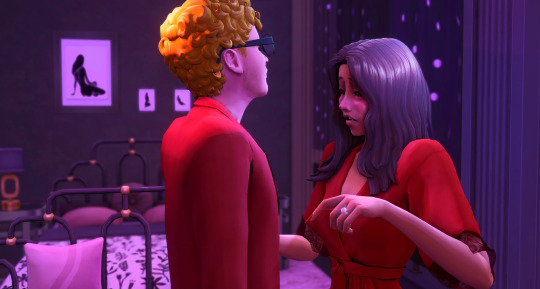
Coni looks up at him with a sympathetic frown, her fingers tracing the collar of his shirt. A soft chuckle escapes her lips, though in her ragged and worn-out voice, it sounds more like a whimper.
Coni: [Sighs] No baby, you won't.
Sunglo: Sorry?
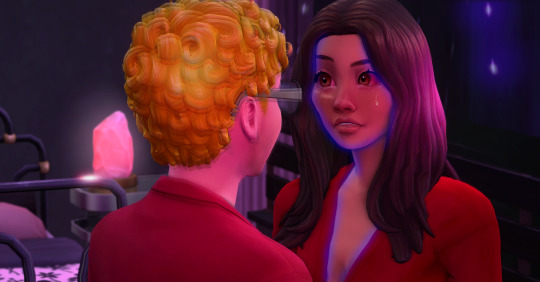
Coni: You won't. That's the thing. You'll never find out. You're the smartest man I've ever known, but I'll always be one step ahead of you... thanks to my genetic advantages. I destroyed Cecilia. I had to. And If I wanted you to forget all of this, I could make that happen with the snap of my fingers. But I'm just so tired of this game. I'm so tired of hiding from you, my darling.
A tear falls down Coni's cheek, against all efforts to stop it. Sunglo's stomach churns as a faint blue aura begins to emit from her skin; the same blue aura that comes from Aurora when playtime is cut short, or she doesn't get the toy she asks for. Everything starts to fall into place.

Sunglo: No... [Shakes head, tears forming] Concept... you're scaring me...
Coni's eyes mirror the tears welling in his. She tries to vocalize "I'm sorry," but only manages to mouth the words, her voice failing her.
Sunglo: This can't be real. I feel sick. Is this real?
Coni: I... Do you want me to show you? ...Myself? My real form?
Sunglo: What? No! Those things, they—[lowers voice] they violated me, Con... And you? You're really one of them? Did you help them?
Coni: NO! Mod, no. I would never do that to you, Glo! I would never hurt you. I'm not like them. I was raised here in Strangerville. I don't do what they do, okay honey?

Sunglo: What do you do, then? Lie and manipulate? And apparently destroy? Why? Why'd you do that to Cecilia?
Coni: She… she knew too much.
Sunglo: Oh, It all makes sense now. You were protecting yourself.
Coni: I— [stops herself]
Sunglo: I think I'm gonna be sick... I should go.

Coni: Baby, please… Wait, just come sit down. We can fix this, okay? We can get back to our normal happy life! We can fix Cecilia. We can fix us.
Sunglo: I… I think I need some time to think about this.
Coni: Think about what? Stop, you're scaring me, now! What are you saying, Glo? We were supposed to be—this life we made for us… it's perfect. Our love is perfect.
Sunglo: It was perfect. You destroyed it. It was a lie, Coni. You lied to me.

Coni: PLEASE! I'm the same Coni you've always known. We were supposed to get married, Glo! You just proposed. You gave me Agnes's ring, I know that means something special, please!
Sunglo: Keep the ring. But— I think we need to call off the engagement for now.
Coni: Call it off? What are you saying? What does this mean for us? If you don't want to marry me then you don't want to be with me, either! [Sobbing]
Sunglo: I just need time, Coni.
Coni: What about our family and friends? Erwin? He definitely won't be able to handle this. Are you going to tell them I'm an alien so that they all hate me too?
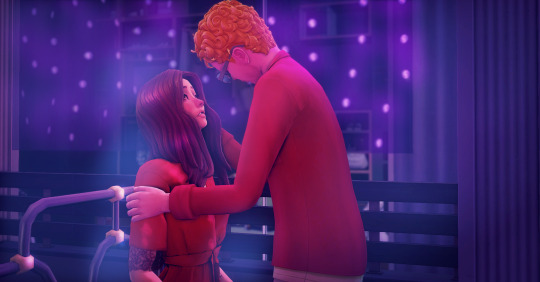
Sunglo: Of course not. You tell them when you're ready. And for what it's worth, they'll always love you. I'll always love you, Concept. Okay? I… I just know I'll never be able to reconcile, and I… I just need to think about whether I can live with that or not... forever.
Coni: [Sniffles]...S-so this is goodbye, then?
Sunglo: Only for now.

#ts4#sims 4#the sims 4#ts4 story#MD4season10#MD4#Sunglo Darling#Strangerville#Coni Breeder#altercation#intense interactions#emotional distress#read with care as always!
62 notes
·
View notes
Text
Hating everything about existing so bad that I can practically hear my soul tantruming like an angry child
#bpd safe#bpd thoughts#emotional disregulation#emotional distress#bpd rage#bpd problems#mental illness#cluster b#the hare ensnared#the hare declares#substance abuse#bpd
54 notes
·
View notes
Text
By: Julian Adorney, Mark Johnson and Geoff Laughton
Published: Mar 23, 2024
In The Divine Conspiracy, Dallas Willard tells the story of a jet fighter pilot who was practicing high-speed maneuvers. As Willard puts it, “She turned the controls for what she thought was a steep ascent—and flew straight into the ground. She was unaware that she had been flying upside down.”
What if we were flying upside down? But let’s go further. What if an entire generation was flying upside down–flying through fog and danger, unable to see either ground or sky, and the well-intended adjustments pushed on them by “experts” were just bringing them closer to catastrophe?
That’s the lens through which we interpret Abigail Shrier’s New York Times bestseller Bad Therapy.
There’s no denying that the youngest generation is in crisis. As the Addiction Center notes, members of Generation Z “run a higher risk of developing a substance abuse problem than previous age groups.” A 2015 report found that 23.6 percent of 12th graders use illicit drugs. The American Psychological Association reports that just 45 percent of Gen Zers report that their mental health is “very good” or “excellent,” compared with 51 percent of Gen Xers and 70 percent of Boomers. A concerning 42 percent of Gen Zers have been diagnosed with a mental health condition, and an astounding 60 percent take medication to manage their mental health.
It gets worse. The rate of self-harm for girls age 10-14 increased over 300 percent from 2001 to 2019 (before the pandemic). According to a 2021 CDC survey, 1 in 3 teenage girls have seriously considered killing themselves.
Well-meaning therapists, teachers, and school counselors are trying to help the next generation to rise up. But what if everyone involved is upside down? What if, like the fighter pilot that Willard describes, what they think is rising up is actually bringing them into deeper danger? Shrier makes a strong case that that’s exactly what’s happening.
Lots of educators encourage kids to spend more time checking in with their feelings. In the 2021-2022 school year, 76 percent of principals said that their school had adopted a Social and Emotional Learning (SEL) curriculum. Common SEL practices include: asking students how they’re feeling at the start of each day, teaching that students should be more aware of how they’re feeling in any given moment, and encouraging students to use activities like writing and art to express their feelings.
The problem is that all of this obsession with feelings can actually make students feel worse. As Yulia Chentsova Dutton, head of the the Culture and Emotions Lab at Georgetown University, says, “Emotions are highly reactive to our attention to them.” “Certain kinds of attention to emotions, focus on emotions,” she explains, “can increase emotional distress. And I’m worried that when we try to help our young adults, help our children, what we do is throw oil into the fire.” Or to put it another way: when we ask kids over and over again how they’re feeling, we’re subtly and accidentally encouraging them to feel bad.
The reason is that, as psychiatry professor Michael Linden explains, most of us don’t feel happy all the time. Dealing with life involves ignoring a certain amount of moment-by-moment discomfort: I’m tired, my feet hurt, I’m sore from sitting down all day, I’m a little worried about my mom. When we encourage kids to check in many times per day on how they’re feeling, we’re tacitly encouraging them to bring to the surface–and then dwell on–all the things going on in their minds that are not “happiness.” That’s why, as Linden puts it, “Asking somebody ‘how are you feeling?’ is inducing negative feelings. You shouldn’t do that.”
But it gets worse.
Obsessing over our emotions can actually prevent us from doing the things that might make us feel better. Anyone who’s spent too long wallowing after a bad break-up knows this; at a certain point, you have to shelve your unpleasant emotions so that you can get on with your life. Psychologists describe two mental states that we can occupy at any given time: “action orientation” and “state orientation.” “State orientation” is where you focus primarily on yourself (e.g., how you feel about doing the task at hand, whether your wrist hurts or you’re starting to get sick, etc.). “Action orientation” is where you primarily focus on the task at hand. As a study published by Cambridge University Press notes, only the latter is actually conducive to pursuing and accomplishing goals. “State orientation is a personality that has difficulty in taking action toward goal fulfillment,” the authors warn. By encouraging young people to focus so much on their feelings, we might be hurting their ability to adopt the mindset necessary to accomplish goals in life. If so, that would make them even more unhappy.
But the dangers posed by well-meaning “experts” telling students to fly in the wrong direction–towards the ground instead of towards the sky–go well beyond encouraging unhappiness and depression. Rates of suicide and self-harm for young people are skyrocketing. But in their attempts to cope with the spike, well-meaning administrators might be making the problem worse. Here are questions from the 2021 Florida High School Youth Risk Behavior Survey, administered to students age 14 and up:
During the past 12 months, did you ever feel so sad or hopeless almost every day for two weeks or more in a row that you stopped doing your usual activities?
During the past 12 months, did you ever seriously consider attempting suicide?
During the past 12 months, did you make a plan about how you would attempt suicide?
During the past 12 months, how many times did you actually attempt suicide?
If you attempted suicide during the past 12 months, did any attempt result in an injury, poisoning, or overdose that had to be treated by a doctor or nurse?
A survey authored by the CDC asked students “During the past year, did you do something to purposely hurt yourself without wanting to die, such as cutting or burning yourself on purpose?” Another survey offered this question to Delaware middle schoolers: “Sometimes people feel so depressed about the future that they may consider attempting suicide or killing themselves. Have you ever seriously thought about killing yourself?”
Administrators may be asking these questions with the best of intentions, but the end result is to normalize suicide in young peoples’ minds. If you were 12 years old and taking a survey like this along with all of your classmates, you might reasonably conclude that suicide, or at least suicidal ideation and/or self harm, were pretty common at your school. Otherwise, why would everyone your age have to take such an exhaustive assessment about it?
One reason this is so dangerous is that, as Shrier writes, “The virality of suicide and self-harm among adolescents is extremely well-established.” Following the release of Netflix’s TV show 13 Reasons Why, which some said valorized a fictional girl who killed herself, several studies found a spike in teen suicide rates. The CDC agrees. In a post warning about the dangers of “suicide contagion,” the CDC said that journalists should avoid things like:
“Engaging in repetitive, ongoing, or excessive reporting of suicide in the news.”
“Reporting ‘how-to’ descriptions of suicide.”
“Presenting suicide as a tool for accomplishing certain ends” (i.e., as a “means of coping with personal problems”).
But this is most of what the surveys described above are doing. They are deluging students with repetitive and excessive discussion of suicide. They are describing different methods for killing yourself (e.g., cutting or burning yourself). One survey, which asks students who have considered killing themselves why they did so (possible answers include “demands of schoolwork,” “problems with peers or friends,” and “being bullied”) is a textbook example of presenting suicide as a “means of coping with personal problems.”
The authors of these surveys seem to at least recognize the risk that students are flying upside down, and that these surveys might take them closer to the ground. One survey concludes by telling students, “If any survey questions or your responses have caused you to feel uncomfortable or concerned and you would like to talk to someone about your feelings, talk to your school’s counselor, to a teacher, or to another adult you trust.” The survey also includes links to different hotlines.
Communicating to kids that suicide is normal and a possible solution to their problems might be the worst way that some schools are failing kids, but it’s also far from the only way.
Schools are increasingly lax about standards, willing to let almost anyone get away with almost anything. Some accommodations do make sense: for example, it makes sense to give a kid with dyslexia more time to complete the verbal component of the SAT. But Shrier argues that standards are falling for perfectly healthy students too. “School counselors—students’ in-school ‘advocates,’” Shrier writes, now “lobby teachers to excuse lateness or absence, forgive missed classwork, allow a student to take walks around the school in the middle of class, ratchet grades upward, reduce or eliminate homework requirements, offer oral exams in place of written ones, and provide preferential seating to students who lack even an official diagnosis.”
Shrier documents stories of students who have been allowed to turn in work late because they were having a “tough Mental Health Day” or because “I was having a rough day and dealing with my gender identity.”
The problem with this is that one of the primary things that children and teenagers do is try to figure out the boundaries of the world. When a child throws a tantrum, it’s not malicious–they’re trying to understand this new world and figure out what they can get away with. As Jordan Peterson writes in Twelve Rules for Life, young children are “like blind people, searching for a wall.” “They have to push forward, and test,” he writes, “to see where the actual boundaries lie.” What’s true of young children is also true of older children and even (to a lesser extent) adults. All of us are trying to figure out the rules of life–that is, what we can get away with. If well-meaning teachers and counselors tell students that one of the rules is that you don’t have to do your homework on time if you say that you’re having a rough day, then we shouldn’t be surprised when more young people seem to manifest rough days.
But this is the opposite of what students need–especially the truly disadvantaged students who so many of these efforts seem to be aimed at helping. In his memoir Troubled, clinical psychologist Rob Henderson writes that, “People think that if a young guy comes from a disorderly or deprived environment, he should be held to low standards.” But, he warns, “this is misguided. He should be held to high standards. Otherwise, he will sink to the level of his environment.”
So kids are depressed, anxious, and poorly behaved. Educators are trying to help them by encouraging them to tap in more to their feelings, by asking them more questions about suicide, and by trying to accommodate their difficulties even more. But all of this is backwards. Educators are encouraging students to do what they think will take them higher–away from the ground and back to the safety of the sky. But both kids and educators are upside down. And every adjustment that the “experts” are telling kids to make just brings them closer to the ground–and a catastrophic collision.
Now’s a good time to emphasize that this isn’t all schools, all teachers, or all administrators–not by a long shot. There are heroic educators working every day to help students to rein in their problems, stop taking advantage of accommodations that they don’t need, and develop the emotional resilience to deal with the problems of adolescence. But the problems documented above do represent a trend. And while it’s not every school, the trend is too big to ignore.
What will happen if this trend continues–if an entire generation keeps going “up” until they crash into the ground? Most severe and most damaging is the harm to the generation itself. Shrier tells the story of Nora, a 16-year-old girl who helps put a human face on all of the brutal statistics described in the introduction to this piece. Nora describes her friends as going through a litany of serious mental health problems: “anxiety,” “depression”; “self-harm” (as Shrier notes, “lots of self-harm”) including “Scratching, cutting, anorexia,” “Trichotillomania” (pulling your hair out by the roots); and more. As Shrier writes, “Dissociative identity disorder, gender dysphoria, autism spectrum disorder, and Tourette’s belong on her list of once-rare disorders that are, among this rising generation, suddenly not so rare at all.”
But the dangers can also ripple out beyond just one generation. The full danger may be nothing less than an imperiling of our democracy.
As Shrier notes, many kids in school are almost constantly monitored. Her own kids have “recess monitors” at their school–“teachers who involve themselves in every disagreement at playtime and warn kids whenever the monkey bars might be slick with rain.” On the bus home, they have “bus monitors.” Better that kids know they’re being observed by an adult at all times than that one kid push another to give him his lunch money.
One of the most pervasive forms of monitoring is what are called “shadows”—ed techs or paraeducators whose job is to cling closely to one particular student so that they don’t have any issues. The original intention certainly made sense. If a child had autism, a shadow could help the kid to integrate into the main classroom rather than being sent to Special Ed. But, as Shrier notes, scope creep has been substantial. “Today,” she writes, “public schools assign shadows to follow kids with problems ranging from mild learning disabilities to violent tendencies.” Nor is the problem restricted to public schools: “private schools advise affluent parents to hire shadows to trail neurotypical kids for almost any reason.” Shadows monitor and guide almost every interaction with their chosen student, from when to raise her hand to how long to hug a fellow student.
As Peter Gray, professor of psychology at Boston College and an expert on child development, puts it, “Kids today are always under the situation of an observer. At home, the parents are watching them. At school, they’re being observed by teachers. Out of school, they’re in adult-directed activities. They have almost no privacy.”
But when kids spend their entire waking lives being monitored by an adult, they start to think that kind of monitoring is normal. Worse, they start to think that they need it. If a child gets constant guidance from an adult, what are the odds that she’s going to cultivate her own independence? If she expects authoritarian adults to monitor and run every aspect of her life already, what is she going to think of a liberal democracy that more-or-less leaves people free to handle their own affairs?
No wonder just 27 percent of Americans age 18-25 strongly agree with the statement that “Democracy may have problems, but it is the best system of government” (compared to 48 percent of Americans as a whole).
So what’s the solution? If our kids are upside down and getting lower to the ground, then the only thing that makes sense is to help them reverse course. Is there something that’s the opposite of always asking them about their feelings, telling them that life is too much for them or their peers to cope with, and constantly telling them that they’re too fragile to do their homework if they’re having a rough day? Yes. That something is called antifragility.
Antifragility is the idea that whatever doesn’t kill you makes you stronger. As social psychologist Jonathan Haidt and president of the Foundation for Individual Rights and Expression Greg Lukianoff note in The Coddling of the American Mind, kids are naturally antifragile. That doesn’t just mean that they’re tough. It means that “they require stressors and challenges in order to learn, adapt, and grow.” Not letting a kid hand in homework late doesn’t just teach them to do their homework on time; it also teaches them that they can deal with a 0 in class and not die. They can pick themselves up, brush themselves off, and even earn an A in the class overall if they bust a sweat for the rest of the semester. Telling a kid who’s having a “tough mental health day” that you’re sorry to hear it but they still need to take today’s test doesn’t just teach the kid that low-level excuses don’t fly; it also teaches them that a hard day isn’t enough to stop them. It teaches them that they’re stronger than whatever negative emotions they’re currently experiencing.
It’s time to remind kids that they are strong–before it’s too late.
All quotes not otherwise attributed come from Abigail Shrier’s book Bad Therapy.
-
About the Authors
Julian Adorney is a Contributing Writer to FAIR’s Substack and the founder of Heal the West, a Substack movement dedicated to preserving and protecting Western civilization. You can find him on X at @Julian_Liberty.
Mark Johnson is a trusted advisor and executive coach at Pioneer Performance Partners and a facilitator and coach at The Undaunted Man. He has more than 25 years of experience optimizing people and companies. He blogs at The Undaunted Man’s Substack.
Geoff Laughton is a Relationship Architect/Coach, multiple-International Best-Selling Author, Speaker, and Workshop Leader. He is the founder of The Undaunted Man. He has spent the last twenty-six years coaching people world-wide, with a particular passion for supporting those in relationship, and helping men from all walks of life step up to their true potential.
#Julian Adorney#Mark Johnson#Geoff Laughton#Abigail Shrier#Bad Therapy#human psychology#psychology#emotions#emotional distress#feelings#antifragility#coddling#emotional fragility#religion is a mental illness
19 notes
·
View notes
Text
RSCB (Celebrity AU) - CHAPTER 6: Nebulae
This fic is only visible to registered users on AO3.
Word Count: 10.2k+
Chapter Summary:
She faces back at you, “N-now you can e-enjoy all these good lemons without w-worrying they’ll go bad soon.”
Another chuckle escapes you, not quite understanding what granny’s trying to say to you. “What? I don’t get it.”
“Y-you have already gotten o-over the hardest part, dear. E-everything in y-your past had only ‘bad lemons’ b-but now you’ve gotten rid of them.”, she hums, turning her vision back to the sea with such a serene look in her face. “N-now you should enjoy the g-good lemons with your f-friends.”
A/N:
This chapter features an existing AUs and fic in the DCA fandom: Robo-Boyfriends AU! This is it, the final chapter! A lot of things happen here and FAST so prepare yourself >:3
Robo-Boyfriends AU fic can be found HERE! Please read the tags and enjoy.
Not beta-read, we die like Y/N’s past. All mistakes are on me.
Chapter Warnings: Heavy Angst, Heavy Swearing, Emotional Distress, Verbal Fighting, Strong Arguments, Unhealthy Parental Dynamics, Heartbreak, Betrayal, Physical Abuse, Injuries, Heavy Drinking, Violent Breakdowns, Implied Infidelity
#celebrity au#dca fandom#rising stars and celestial bodies#fnaf but not very canon compliant#y/n x sun#y/n x moon#y/n x sundrop#y/n x moondrop#laurswrites#heavy angst#heavy swearing#emotional distress#verbal fighting#strong arguments#unhealthy parental dynamics#heartbreak#betrayal#physical abuse#injuries#heavy drinking#violent breakdowns#implied infidelity#WOOH i am done!!!!!!! the brainrot has succeeded in letting me finish an entire multichapter fic!!!!
33 notes
·
View notes
Text
crimson rivers spoilers
omg they revoked the two victor rules and reg can’t kill James
this is nauseating I’m gonna cry
17 notes
·
View notes
Text
hypervigilance may originate from in our childhood: we were harshly criticized or gaslighted, punished, rejected (our inner critic never let us or what we do be enough); we couldn't feel able to feel safe, loved and provided (we may feel like our needs are too much and neglect them if others cannot meet them); we lacked physical comfort and connection (we feel unsafe both emotionally and physically, anxious and lonely, often not knowing how to soothe ourself); we had to live under lot of stress (we lived and keep living on survival, always looking out for danger in anything and anyone).
to try and get out of that, we can try and recognize how our hypervigilance manifests (does it have a specific daily pattern or it's triggered by something); understand what our mind and body need to be able to relax so to integrate it into our self care; do whatever makes us ablet to feel safe or create a safe space for us; be patient as we're re-learning how to regulate our long-time distressed nervous system and keep practicing. always ask for help to professionals if you need though
(instagram)
#words#healing#important#positivity#thoughts#self love#positive thinking#self healing#healingjourney#love yourself#mental health#emotions#emotional distress#emotional growth#emotional abuse#childhood trauma#childhood issues#tw childhood trauma#tw child neglect#instagram
31 notes
·
View notes
Text
Ellie & Henry; An Unbreakable Bond
Hello. I don't have much in the way of request but I do have two ideas all involving Ellie so likely separate oneshots
#1: An alt ending to an existing scenario or your own scenario where Ellie dies and Henry witnesses it (Think of it as Ellie's version of the "Valiant Hero" ending) the circumstances are up to you it could be Henry and Ellie on their own, them being members of the tophat clan (or Henry as the leader) or them being the good guys with Charles possibly in the story I'm fine with either route
#2: Henry after escaping the wall stops and with hesitation turns around and heads back for Ellie feeling a twinge of guilt for using her and leaving her behind
This one was a lot of fun for me to write even if it took me a while. Down below are the tags for each prompt;
1) Tw/Tags: Toppat Recruits, Heavy Angst, Hurt/Little To No Comfort (Depends On How You See It), Major Character Death, Blood, Emotional Distress, Mild Mentions Of Depression, & (RoseMin) Relationship Can Be Seen As Platonic Or Romantic
2) Tw/Tags: Developing Friendship, Light Angst, Hurt/Comfort, Betrayal, Inner Turmoil, Complicated Relationships & Hopeful Ending
1)
This isn't supposed to happen. It was never part of the game. Nobody is meant to die in this timeline. Not anyone that he particularly cared for but not her.
Not Ellie. His best friend and companion in crime.
She was meant to be here with him. After all they went through together she shouldn't be ripped from his grasp.
Until now she was. Forever gone and he isn't able to change it. He didn't know what to do, even witnessing her totally preventable, and irreversible demise took its toll on him. It was his fault. He could've done something to stop it from happening though it was yanked out of his hands.
Said hands are shaking as he kneels down to her still warm corpse. The death rattle having been seared into his brain. They fist up then relax, clutching tightly like a vice on Ellie's bloodstained shirt.
It wasn't until much later, realized the severity of what had been done, that he's screaming his lungs out, crying, and in such a frenzied state nobody can get him out of it for hours on end.
Afterwards, when someone else in the clan, he couldn't tell who it was, had managed to tear him away from her, he was somewhat able to cool down. He's put in a safe place, alone per his weepy wish to cope.
She was dead because of him.
She choked on her own blood, withering in awful pain because of his mistakes.
Her gorgeous eyes once full of love and pride stared at him with a glassy unfocused haze, fresh with her own tears as life slowly slips from her.
It was torture knowing he was alone again as he's left to wallow in his misery. Often he laid in the same bed she would lovingly and so carefully drag him out of when he himself was too depressed to get up.
But nobody was there to do that. No one who does it like her. They tried, surely in their own unique way however it wasn't the same. Him and Ellie had a specific deep bond.
So it was difficult accepting her death, a slow progression, and it was a hard pill to swallow, that's for sure.
In the unfortunate circumstances, he noted in a rotten grimace, that there's nothing he can do besides sucking it up. At the start, a few days after Ellie's death, he didn't try, instead played ignorance. His words exact, rarely he does speak, will only consist of the topic that she will come back to him in some shape or way.
Eventually, people grew tired and left him to his devices, he understood why. Still they did try their best to be a shoulder to lean on if he allowed them. For some, he did do that when he couldn't fight anymore. Oftentimes he was eerily silent, still crying but it eluded him once he realized that no longer did anything come out.
And so he stands on the special balcony for the orbital station that's shielded nicely with a thick, sturdy glass. The void of space colored in blacks, blues, purples and his favorite, red was refreshing as it is a daunting beauty. His sore eyes were dry when he wiped his sleeve across them, sniffling and wincing a bit at the slight pain. He grips his shaking hands on the banister, breathing deeply through his nose as he watches the larger than life twinkling stars hover above him.
He is going to get better for his sake. Ellie's even since he knows she wouldn't stand for this.
***
2)
Regret seeps in like poison. Henry was used to being alone, always on his own. So when climbing through the vents and popping out, he hesitates to move forward. It wouldn't be the first time he betrayed someone or had the same happened to him.
Though this was different. Somehow unlike the times he did this, Henry felt bad. Guilty.
In a world, cruel and unfit towards people like him and coincidently her as well should know better better to blindly trust. That's why he did what he'd done without having looked back to see her reaction as his experiences with the same hardened him.
She was down on her luck. Just like him but she entirely gave up. He still had his fight in him. That's why he's here to begin with, right behind two guards chattering away unaware of his presence, while deciding what to do next. About to make a break for it.
Maybe he should head back just for the heck of it. What would go wrong?
So he did, begrudgingly, mind you, he wasn't used to this.
Once he returns to the hole in the ceiling, he cautiously peeks over, taking in the scene of the redheaded woman now curled up in the furthest corner. In the room already so empty and cold, near the door, is the warden’s right hand looking straight ahead, again unaware.
Softly he makes a noise in order to get her attention which she wasn't bothering to try, even ignoring to seemingly in his growing annoyance. The redhead must know he's here for her.
He's just trying to help her! In some way he was trying to apologize and that's rare for someone like him anyways.
As the thief resists the urge to hiss louder or even cut his losses and turn back, he hooks his feet on the hanging staircase. Why it was there is beyond him. Then he curses it upon losing his footing, falling to a crumpled heap in front of the shocked woman.
Before long he stumbled on his feet, she was gobsmacked to see him as he grabbed onto her arm. Unsurprisingly, the warden’s deputy noticed, stormed into the waiting cell, seeing that Henry was without his cuffs. It won't be long when the true shit goes down so he'd have to rush for it.
Hope for the best outcome as this wasn't his plan.
With her in tow, forcibly behind him, he made a beeline to the door. He may be a scrawny guy at least compared to the other man but he isn't a literal pushover. Thankfully, as by pure luck it remains at his side too once he barrels past, knocking the other down with ease. Another surprise to him is that she's running alongside with little resistance.
The blaring noise of sirens rings in his ears seconds later. He kept going, huffing from the exertion and the mild irritation that throbs in his head. Soon he takes a sharp turn down the hallway, a path chosen in his mind.
It won't be his smartest, cleverest ones out there, just one that would work for right now at this moment. At the hall's end, close to an office, he slams a fist into a circuit board on the wall, all in the dwindling hopes it's the right choice.
The door slams shut so it was to his relief.
He lets go, turns to face her, when he does is instantly met with an angry scowl, and a cold glare. Worse, he is caged in and she can do anything to him. She doesn't, instead stands there, hunched, in stiff silence, except for her ragged breaths filling the air. The cuffs that completely covered her hands so that may be the sole reason why.
In his hesitancy, Henry steps forward, hands up in faux surrender, with no words that he's no threat to her. Eyeing her cuffs then at the room they're in, he notices one, the decently sized trophy likely carrying a heavy weight and secondly, the vent in the ceiling.
Moments later, trophy in hand, he bashes the cuffs until they drop on the ground broken. In a groan, he steps back, leaning on the table and motions to the ceiling. She runs her free hands together, as if attempting to gather the warmth.
Of course, she's highly skeptical. Right until he's on his knees ready to boost her up. He doesn't mind being the one to do the lifting this time. She looks around and he knows she's searching for another exit. Then she moves quite quickly, placing her foot on his knee.
In a flash, the hinges of the vent break apart and she climbs up.
Henry stands up, dusting off and he hears the sound of people outside the door get louder.
When he does look up at the ceiling, almost surprised to see she remains there, allegedly waiting, maybe uncertain about the choices laid out for her. It won't shock him whether she takes the grand opportunity to simply leave him behind.
Until she stretches a hand out for him.
#Ask Box Is Always Open#Request Fic#Long Fic#Thsc Fic#Thsc Au#Toppat Recruits#Henry Stickmin#Ellie Rose#Rosemin#The Henry Stickmin Collection#Henry Stickmin Collection#Heavy Angst#Whump#Ellie Rose Whump#Henry Stickmin Whump#Death Tw#Blood Tw#Major Character Death#Hurt/Comfort#Emotional Distress#Inner Turmoil#Hopeful Ending#No Dialogue#Guilt#Hurt/Little#Comfort#Hurt/No Comfort#Depression Mention
18 notes
·
View notes
Text

Armand Cambon (1819-1885)
"Too Late or The Letter"
Oil on canvas
Located in the Musée Ingres Bourdelle, Montauban, France
#paintings#art#artwork#genre painting#female portrait#armand cambon#oil on canvas#fine art#musée ingres bourdelle#musee ingres bourdelle#museum#art gallery#french artist#portrait of a woman#genre scene#white dress#dresses#clothing#clothes#side profile#upset#emotional distress#distressed#troubled#interior#1800s#19th century
160 notes
·
View notes
Text

Part 1
It's late. Past 1 AM. Coni returns to the Old Penelope Bunker expecting Sunglo to be asleep in his bed, where she could crawl up next to him, easing any tension caused by her unanswered text. She planned on having him feeling so euphoric, he wouldn't even think to ask about Cecilia. But he's not in bed. She finds him in the sickly dim light of the kitchen waiting for her. He sits silently, no gadgets or bots to fidget with. Coni has never seen him appear so vacant.
Sunglo: I haven't heard from you all night.
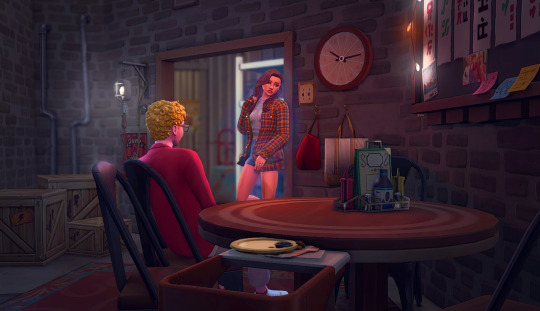
Coni rushes through a flimsy excuse about his aunts being "really chatty," but Sunglo quickly redirects, immediately questioning Cecilia's whereabouts. Coni's eyes widen, realizing just how long she's left Erwin alone.
Coni: Oh mod, Erwin! [Takes off down the hall]

The screech of the chair against the stone floor echoes through the spacious halls of the bunker as Sunglo scrambles to his feet trying to get to her.
Sunglo: Coni, wait!
By the time he exits the kitchen, she's already beelining around the corner, her hurried footsteps quickly fading into the distance as he struggles to follow.

Coni reaches Erwin's door first, and of course it's locked, giving Sunglo time to catch up with her. He grabs her arm, firmly but gently, careful not to hurt her. He demands an explanation.
Coni: I... I borrowed Erwin's flannel. I promised him I'd return it tonight.
Sunglo: Okay, well he's asleep right now. I'm sure he'll be fine if you get it back to him in the morning. Will you just relax?
Coni: You saw him come home?
Sunglo: Yes, right after work.

Coni breathes a sigh of relief upon learning he's still safe.
Sunglo: [Still holding her wrist firmly] What's gotten into you? Where's Cecilia?
Coni jerks away and rubs her forehead.
Coni: It's a long story, okay? I need to shower.
Sunglo eyes her, puzzled, and she retreats back down the hall.
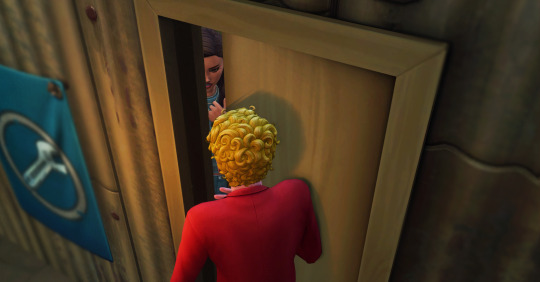

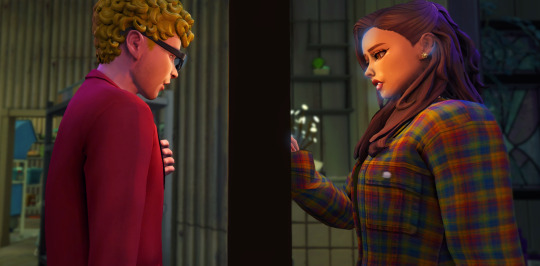
A momentary tussle ensues over the bathroom door. However, Sunglo, not wanting to hurt or frighten Coni, ultimately relents. He takes a step back, allowing Coni to slam the door shut.
Sunglo: [Voice strained and defeated] Concept, please tell me what's going on... Baby?

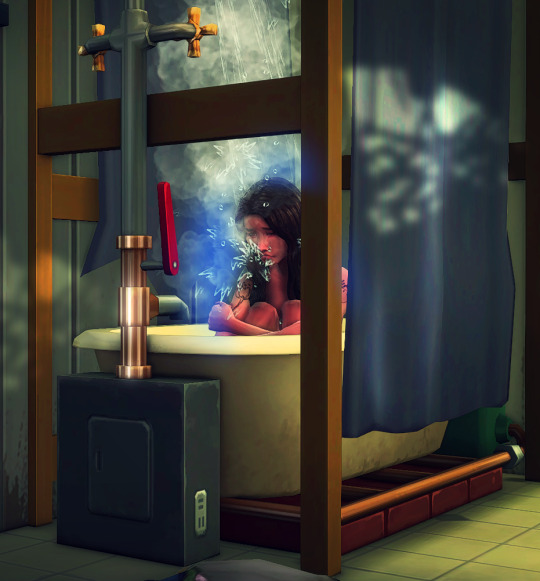
Coni locks the door behind her and lets the water wash over her, tears merging with the stream as she braces herself for the next phase of this ordeal.
Part 2 Here
#ts4#sims 4#the sims 4#ts4 story#MD4season10#MD4#Sunglo Darling#Strangerville#Coni Breeder#altercation#intense interactions#emotional distress#lots of cw here#read with care <3
48 notes
·
View notes
Text
I just need someone to hold me like a child and tell me it's okay while they light my joint for me and let me cry about things that aren't even close to being real or true but they're real and true to me please please someone please I'll give you all my money
#bpd love#bpd problems#bpd episode#mental illness#bed rotting#beware the hare#please i'm begging#cluster b#substance abuse#mdd thoughts#vent post#im so tired#emotional distress#mentally exhausted
7 notes
·
View notes
Text
PSA: Driving While Distressed
Hello Internet, tonight I'm going to share a story from my weekend about why I now have an incredibly sore neck in place of a car.
The other day I spent my day with my best friend and his girlfriend, whom I hardly talked to before that day. To make a long story short, I ended up being immensely overwhelmed pretty much the entire day and I felt horrible about it. But instead of dealing with the guilt I experienced over that day and calming down, I briefly cried in my car and took off.
I wasn't thinking straight, and my reaction time had been getting increasingly worse into the night. So while I was speeding down the country road (the limit was roughly 55 mph and it was largely desolate, so I was going closer to that limit), it didn't register in my brain when two cars were pulled over on the side of the road and flashing red and blue lights came down the other lane. I attempted to slow down and pull over along with these cars. Perhaps seven seconds before impact, I realized that I wasn't going to slow down in time, and so my best bet was to slow down quick enough to minimize damage while not stopping so fast inertia would get the better of me. I ended up ramming the right front of my car into their left rear wheel.
Nobody was severely injured, and the other driver was even able to drive off. By all means, everything went relatively fine. Of course, except for the fact that I no longer have a car and am suffering from a decent case of whiplash (sore neck/upper back and a little dizziness). But I got lucky.
I think about what would have happened if I didn't stop at all, or if I slowed down faster or didn't react as fast. And most of all, I think about how none of this would have happened to begin with if I had just stayed in that driveway and sobbed my brains out.
So please everyone, if you find yourself emotionally distressed, take a minute and deal with your feelings, whatever that may entail. Because trying to repress your emotions could very much distract you on the road, and it's better to be vulnerable than dead.
6 notes
·
View notes
Text
RSCB (Celebrity AU) - CHAPTER 3: Constellations
This fic is only visible to registered users on AO3.
Word Count: 9k+
Chapter Summary:
“How about a little date, you and me?”, Sun swivels his entire body, sides leaning on the wall in replacement of his back. He slides his thumb on the underside of his yellow tie, feeling the fabric.
You smirk out a playful, “Flirting with your co-worker during work hours doesn’t sound like you, ‘Detective Sun’.”
Sun shifts once more, pushing his back against the wall with his hand still clutching his tie. His face plate turns to face you, the golden sheet rays subtly bouncing in and out slowly. “Well, you’re quite the exception.”
A/N:
This chapter features two other existing AUs and fics in the DCA fandom: Robo-Boyfriends AU and Sleuth Jesters (Detective AU)!
Robo-Boyfriends AU fic can be found HERE! While Sleuth Jesters by @naffeclipse can be found HERE! Also the Detective Designs for the DCA in Sleuth Jesters are made by @/sunnys-aesthetic on Tumblr! Anw that's all, please read the tags and enjoy.
Not beta-read, we die like Y/N’s perception of the truth. All mistakes are on me.
Chapter Warnings: Angst, Swearing, Flirting, Emotional Distress, Emotional Manipulation, Jealousy, Possessive Behavior, Drinking As A Coping Mechanism, Begging and Desperation, Verbal Fighting, Distrust, A Bit of Violence, Blood, A Bit of Self-Harming Ideation, Minor Injuries
#celebrity au#rising stars and celestial bodies#dca fandom#fnaf#not very canon compliant#y/n x sun#y/n x sundrop#y/n x moon#y/n x moondrop#laurswrites#angst#swearing#flirting#emotional distress#emotional manipulation#jealousy#possessive behavior#drinking as a coping mechanism#begging and desperation#verbal fighting#distrust#violence#blood#cw self harm#minor injuries#yeahhhh heavy chapter. what did i expect.... its a toxic relationship au lol
29 notes
·
View notes
Text
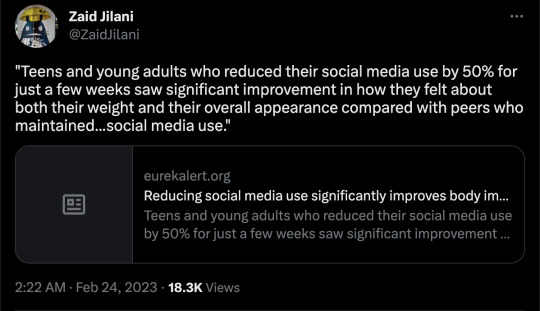
By: American Psychological Association
Published: Feb 23, 2023
Teens and young adults who reduced their social media use by 50% for just a few weeks saw significant improvement in how they felt about both their weight and their overall appearance compared with peers who maintained consistent levels of social media use, according to research published by the American Psychological Association.
“Adolescence is a vulnerable period for the development of body image issues, eating disorders and mental illness,” said lead author Gary Goldfield, PhD, of Children's Hospital of Eastern Ontario Research Institute. “Youth are spending, on average, between six to eight hours per day on screens, much of it on social media. Social media can expose users to hundreds or even thousands of images and photos every day, including those of celebrities and fashion or fitness models, which we know leads to an internalization of beauty ideals that are unattainable for almost everyone, resulting in greater dissatisfaction with body weight and shape.”
However, much of the psychological research on social media, body image and mental health is correlational, according to Goldfield, so it is uncertain whether people with body image and mental health issues spend more time on social media or if social media use leads to greater body image and mental health issues.
To better understand the causal effects of reducing social media use on body image, Goldfield and his colleagues previously conducted a pilot study with 38 undergraduate students with elevated levels of anxiety and/or depression. Some of the participants were asked to limit their social media use to no more than 60 minutes per day, while others were allowed unrestricted access. Compared with participants who had unlimited access, participants who restricted their use showed improvements in how they regarded their overall appearance (but not their weight) after three weeks. Due to the small sample size, though, the researchers were unable to conduct a meaningful analysis of the effect of gender.
The current experiment, involving 220 undergraduate students aged 17-25 (76% female, 23% male, 1% other) and published in the journal Psychology of Popular Media, sought to expand the pilot study and address the gender limitation. In order to qualify, participants had to be regular social media users (at least two hours per day on their smartphones) and exhibit symptoms of depression or anxiety.
For the first week of the experiment, all participants were instructed to use their social media as they normally would. Social media use was measured using a screentime tracking program to which participants provided a daily screenshot. After the first week, half the participants were instructed to reduce their social media use to no more than 60 minutes per day. At the start of the experiment, participants also responded to a series of statements about their overall appearance (e.g., “I’m pretty happy about the way I look,”) and weight (e.g., “I am satisfied with my weight,”) on a 5-point scale, with 1 indicating “never” and 5 “always.” Participants completed a similar questionnaire at the end of the experiment.
For the next three weeks, participants who were instructed to restrict their social media use reduced it by approximately 50% to an average of 78 minutes per day versus the control group, which averaged 188 minutes of social media use per day.
Participants who reduced their social media use had a significant improvement in how they regarded both their overall appearance and body weight after the three-week intervention, compared with the control group, who saw no significant change. Gender did not appear to make any difference in the effects.
“Our brief, four-week intervention using screentime trackers showed that reducing social media use yielded significant improvements in appearance and weight esteem in distressed youth with heavy social media use,” said Goldfield. “Reducing social media use is a feasible method of producing a short-term positive effect on body image among a vulnerable population of users and should be evaluated as a potential component in the treatment of body-image-related disturbances.”
While the current study was conducted as a proof of concept, Goldfield and his colleagues are in the process of conducting a larger study to see if reduction in social media use can be maintained for longer periods and whether that reduction can lead to even greater psychological benefits.
Article: “Reducing Social Media Use Improves Appearance and Weight Esteem in Youth with Emotional Distress,” by Helen Thai, BA, McGill University; Christopher Davis, PhD, Wardah Mahboob, MA, Sabrina Perry, BA, and Alex Adams, BA, Carleton University; and Gary Goldfield, PhD, Children’s Hospital of Eastern Ontario. Psychology of Popular Media, published online Feb. 23, 2023.
==
If reducing online use results in improvements to self esteem and perception, I wonder what the effect would be of an increase?
#mental health#mental health issues#self esteem#body image#social media#distress#emotional distress#human psychology#psychology#social media cleanse#religion is a mental illness
32 notes
·
View notes